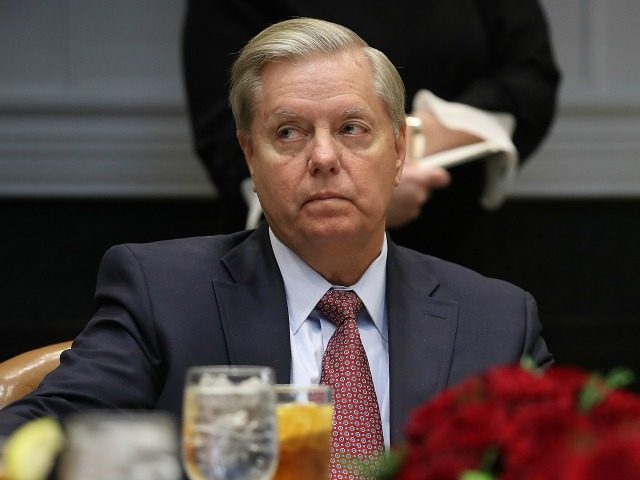GOP politicians are needling, pressuring and cajoling President Donald Trump to drop some of his popular, pro-American immigration priorities.
Trump is meeting today with a group of pro-amnesty Republican Senators in the White House, including Sen. Lindsey Graham, the GOP Senator who put together the “Gang of Eight” amnesty in 2013 which split the GOP. Throughout the 2016 campaign, Graham slammed Trump while boosting Jeb Bush.
The face-to-face meeting gives Graham and other pro-amnesty Senators another opportunity to salami-slice Trump’s list of priorities, even before the GOP Senators offer further concessions to Democratic Senators. Normally, this form of direct lobbying of the president is blocked when Trump’s top deputies meet and negotiate with business-first GOP Senators and immigrant-first Democrats.
The bipartisan establishment’s salami-slice strategy was sketched by Texas GOP Sen. Jon Cornyn:
But Trump and his deputies have repeatedly described his priorities in great detail since October 8, when he released his immigration principles.
Trump has used his Twitter account to repeatedly declare that he wants to end chain migration, the visa lottery and to reform tangled immigration laws that hinder repatriations of illegals.
Cornyn opposes Trump’s plan to quickly end chain-migration. If implemented, the plan would halve the annual delivery of wage-cutting cheap-workers and welfare-aided consumers to American business groups, such as the U.S. Chamber of Commerce.
According to the McClatchy new service:
Trump hasn’t been involved in the day-to-day negotiations on Dreamers ever since he was accused of backing out of a tentative agreement with Democrats in September and insisted the issue be part of a larger immigration package.
Sen. Lindsey Graham, R-S.C. and Sen. James Lankford, R-Okla. confirmed to McClatchy Wednesday night that they planned to attend the White House meeting. An aide to Sen. Thom Tillis said the North Carolina Republican would also participate.
Graham is a sponsor of the Democrats’s huge DREAM Act amnesty, which would deliver millions of foreign migrants into the nation’s consumer and labor markets at the cost of at least $26 billion during the first ten years.
Tillis is an outsourcing-advocate who is pushing a similar amnesty bill, dubbed the SUCCEED Act.
Lankford, who is helping Tillis, argues that illegal immigration promotes competition in the labor market.
The Thursday meeting is being praised by advocates for a cheap-labor economy. According to McClatchy:
“It’s clear there’s a deal to be struck on protecting Dreamers and strengthening border security, so the fact that the president and Republicans in the Senate are actively meeting on this is very promising,” said Jeremy Robbins, executive director of the Partnership for a New American Economy, which is working with Republicans and Democrats who support protecting DACA recipients.
Robbins’ group was created by billionaires Mike Bloomberg and Rupert Murdoch, both of whose businesses would gain from an extra inflow of cheap labor and welfare-aided consumers.
Trump’s priorities are very popular with voters and likely will help in the 2018 elections.
A December poll of likely 2018 voters shows two-to-one support for Trump’s pro-American immigration policies, and a lopsided four-to-one opposition against the cheap-labor, mass-immigration, economic policy pushed by bipartisan establishment-backed D.C. interest-groups. The poll for NumbersUSA is another reminder to politicians that the business-funded ‘Nation of Immigrants” polls distract attention from voters’ private views, which were shockingly displayed on the evening of November 8, 2016.
Business groups and Democrats tout the misleading, industry-funded “Nation of Immigrants” polls because they which pressure Americans to say they welcome migrants, including the roughly 700,000 ‘DACA’ illegals and the roughly 3 million ‘dreamer’ illegals.
The alternative “priority or fairness” polls — plus the 2016 election — show that voters in the polling booth put a much higher priority on helping their families, neighbors, and fellow nationals get decent jobs in a high-tech, high-immigration, low-wage economy.
Four million Americans turn 18 each year and begin looking for good jobs in the free market.
But the federal government inflates the supply of new labor by annually accepting 1 million new legal immigrants, by providing work-permits to roughly 3 million resident foreigners, and by doing little to block the employment of roughly 8 million illegal immigrants.
The Washington-imposed economic policy of mass-immigration floods the market with foreign labor, spikes profits and Wall Street values by cutting salaries for manual and skilled labor offered by blue-collar and white-collar employees. It also drives up real estate prices, widens wealth-gaps, reduces high-tech investment, increases state and local tax burdens, hurts kids’ schools and college education, pushes Americans away from high-tech careers, and sidelines at least 5 million marginalized Americans and their families, including many who are now struggling with opioid addictions.
The cheap-labor policy has also reduced investment and job creation in many interior states because the coastal cities have a surplus of imported labor. For example, almost 27 percent of zip codes in Missouri had fewer jobs or businesses in 2015 than in 2000, according to a new report by the Economic Innovation Group. In Kansas, almost 29 percent of zip codes had fewer jobs and businesses in 2015 compared to 2000, which was a two-decade period of massive cheap-labor immigration.
Because of the successful cheap-labor strategy, wages for men have remained flat since 1973, and a large percentage of the nation’s annual income has shifted to investors and away from employees.

COMMENTS
Please let us know if you're having issues with commenting.